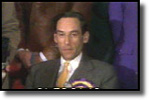
|
28 February 1974The failure of Edward Heath's Conservative government to resolve the industrial disputes that blighted Britain's economy forced him to go to the country, seeking a fresh mandate which would enable him to take the unions to task. Heath came undone as the Labour Party appealed to the electorate as the only party capable of managing the unions. Labour's Harold Wilson was once again prime minister, albeit of a minority government.
Background
The Government's reaction to the miners' overtime ban was swift. Within 24 hours a State of Emergency was declared. Electricity was rationed and the Government launched an "SOS" campaign: "Switch Off Something". Petrol rationing seemed a real possibility. As the Government and the miners found themselves unable to reach an agreement, the TUC attempted to negotiate a settlement. As the dispute dragged on the Government announced that from 1 January, electricity supplies for industry would be reduced to three days a week. This policy was roundly attacked by Labour's shadow minister for industry, Tony Benn, who claimed that the Government's action was unnecessary. The Government's refusal to capitulate to the miners was based on Heath's conviction that the country simply could not afford to meet their demands. The rail union, ASLEF, renewed the pressure on the Government when it announced industrial action in December. This was followed by the miners' announcement of an all-out strike from February. Heath and his Cabinet now came to the conclusion that a general election on the issue of "who governs the country" was unavoidable, even though the Government had a possible 18 months left in office. The date was set for 28 February.
Firstly, Tory MP Enoch Powell embarrassed the Government by making public his decision to vote Labour. He dismissed the election as "essentially fraudulent" and urged Tory voters opposed to the European Common Market to vote Labour. Powell's desertion was a gift which Labour leader Harold Wilson and his press secretary, Joe Haines, exploited with skill. Secondly, the head of the CBI, Campbell Adamson, further increased the Government's woes when he criticised its record on industrial relations only two days before the election. In contrast, the Labour Party was busy publicising its "Social Contract", a document drawn up with the TUC designed to put an end to harmful industrial disputes. All three parties went to the country promising an end to the twin evils of industrial strife and inflation. The Labour manifesto, Let us Work Together: Labour's Way Out of a Crisis, also promised improvements in the health service and greater funding for education. The Tories' manifesto, Firm Action for a Fair Britain, concentrated on tough action to control the unions tempered with a commitment to the welfare state. The Liberal manifesto, You Can Change the Face of Britain, offered harsh penalties against employers and employees who reached inflationary wage settlements.
The two main parties both saw their share of the vote decline and the balance of power now rested with the Liberals. Heath entered into negotiations with the Liberal leader, Jeremy Thorpe, for a coalition Government. For several days the country waited to see if between them they could form a new government. Thorpe was keen, but a coalition with the Tories threatened to split his party and he eventually declined. On 4 March 1974 Harold Wilson entered 10 Downing Street as Prime Minister for the third time. But with Labour 17 seats short of a majority a second election loomed. The February election of 1974 represented one of the biggest breaks from Britain's rigid two party system. The Liberals fielded their greatest number of candidates since 1906 and won 19.3% of the vote but gained only 7 seats. The Liberals increase in the share of the vote was largely at the expense of the Conservatives, whose share dropped 8.2%. Labour's share only fell by 5.8%. Overall Labour achieved a 1.2% swing from the Tories. The Scottish National Party doubled its share of the Scottish vote and its number of seats rose from one to seven. Nationalists also experienced success in Wales, where Plaid Cymru won its first two seats in a general election. The turnout for the election, 78.2%, was six points higher than that of the post-war low of 1970. Enoch Powell decided not to contest his Wolverhampton seat and left the House temporarily. Those entering the House included Nigel Lawson, Norman Tebbit, Cecil Parkinson, Jonathan Aitken on the Tory benches, and Robin Cook on the Labour side.
|
Diana, Princess of Wales, 1961-1997
Conference 97
Devolution
The Archive
News |
Issues |
Background |
Parties |
Analysis |
TV/Radio/Web
Interactive |
Forum |
Live |
About This Site
News |
Issues |
Background |
Parties |
Analysis |
TV/Radio/Web
Interactive |
Forum |
Live |
About This Site
© BBC 1997 |
politics97@bbc.co.uk |


